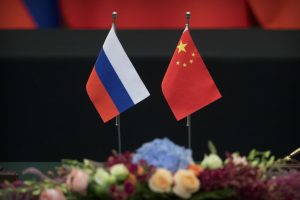That China and Russia have been enjoying a honeymoon period in their relationship is well known. Since China’s Xi Jinping took office in 2013, he has met his Russian counterpart, Vladimir Putin, more than 30 times. China’s state media, including CCTV, have actively trumpeted the solidarity of bilateral relations centered on meetings between Xi and Putin.
In order to fully understand China-Russia ties and their achievements, however, it is necessary to examine not only summits but also meetings between the ranking officials of the two countries. Of particular importance in the realm of foreign and security affairs are the “consultations” conducted at the vice-ministerial level. Since April 2015, when the “First Consultation on Northeast Asian Security” was held in Shanghai, a total of eight rounds of talks were held through October 2017. After that, in January 2018 the talks were renamed as the “Consultation on the Korean Peninsula Issue.” What were discussed at those meetings? Why did the theme of the consultation change from “Northeast Asian security” to the “Korean Peninsula issue”?
While evidence is hard to come by, there are some clues from the relevant press releases. First of all, the Terminal High Altitude Area Defense (THAAD) system deployed on the Korean Peninsula served as a key backdrop for eight rounds of consultations between Russia and China. The controversy over THAAD deployment on the Korean Peninsula erupted in June 2014 when General Curtis Scaparrotti, then the commander of the United States Forces Korea (USFK), officially called for the need to deploy THAAD on the peninsula. In February 2015, then-Chinese Defense Minister Chang Wanquan expressed concern about THAAD during a talk with his South Korean counterpart.
It was against this background that the “First Consultation” between Beijing and Moscow was held. When South Korea and the United States announced in February 2016 that they had decided to officially discuss THAAD deployment, China and Russia strongly protested. For about a year and half, from March 2016 to October 2017, China and Russia called up as many as seven rounds of their vice-ministerial consultation, expressing concern over THAAD deployment on the Peninsula. But the THAAD issue was no longer mentioned at these Sino-Russian talks after Seoul and Beijing held discussions on THAAD in late October 2017.
In addition, the development of a peace mood on the Peninsula, due largely to improved inter-Korean relations, apparently inspired the name change from “Consultation on Northeast Asian Security” to “Consultation on the Korean Peninsula Issue.” At the January 2018 meeting, as expected, both countries positively noted the recent easing of tensions on the Peninsula, centered around that year’s PyeongChang Olympics. They also stressed their pro-peace measures, such as China “suspension-for-suspension” proposal or “dual-track approach” and Russia’s “step-by-step” roadmap were practical and realistic solutions to resolve tensions on the peninsula. These measures were thinly-veiled attempts to check Washington’s unilateral influence and pressure over Pyongyang by actively participating in issues such as the North Korean nuclear program. It is thus important to note the changing context in which the name of consultations was changed.
Since March 2019, both countries have begun to discuss not only the Korean Peninsula issue but also other issues of mutual concern at these vice-ministerial talks. At the March 2019 meeting, for instance, the “Afghan issue” was added to the agenda – just as U.S.-Taliban peace talks began ramping up. Similarly, “South Asia” was part of the August 2019 consultation. The most recent consultation, held in January 2020, discussed broader issues related to the “Asia-Pacific situation.”
All in all, it seems obvious through these vice-ministerial meetings Beijing and Moscow have addressed a wide variety of issues including THAAD, security issues on the Korean Peninsula, and South Asia. At the same time, they wasted no time in putting the brakes on their discussions about the Peninsula, which had been centered on North Korean-U.S. dialogue. The range of topics noted above attest to their unsaid motives. The consultations are part of “soft balancing” strategy adopted by China and Russia to challenge the influence of the hegemonic power, the United States. With the United States continuing to hold both Beijing and Moscow at bay, it is possible and even likely that they will get closer, and the possibility of quasi-aligned hard balancing cannot be ruled out.
Sunjae Kim is a foreign information specialist on China at the National Assembly Library in South Korea.
Taeho Kim is a professor at Hallym University of Graduate Studies.































